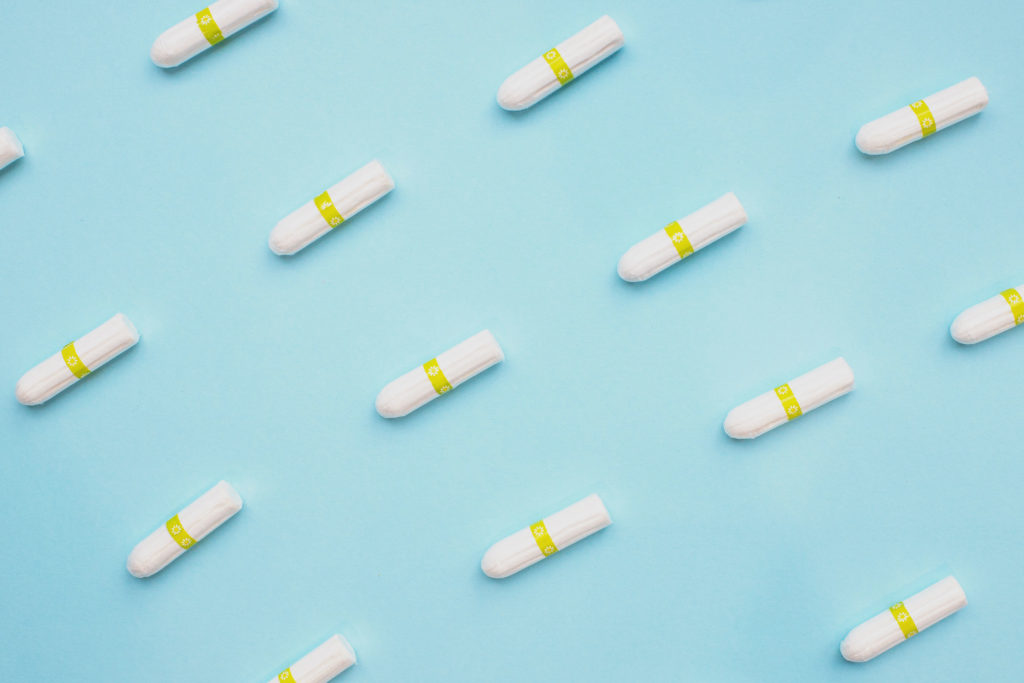Volcanoes are erupting in The Philippines, but on-fire Australia received some welcome rain. The Iran war cries have been called off and The Donald’s military powers are about to be hamstrung by the Senate. Meanwhile, his impeachment trial is starting, and we’re all on Twitter for a front-row seat.
Progress in Five Minutes: Abolishing the Tampon Tax
Periods aren’t a luxury, unless you ask the government. Here’s how that’s changing in the United States and around the world.
Updated November 8, 2021
No one signs up to get a menstrual cycle. But for too long, period products like tampons, pads, and menstrual cups have been classified as nonessential purchases and subject to higher sales tax than other items like food, prescriptions, condoms (sigh), and even flowers.
For what on the surface may seem like a sexist annoyance has significant implications for women and girls living in poverty around the world. Women who can’t afford period products might miss school, resort to using their kids’ diapers, or even go to the emergency room to get free pads. States across the United States have in recent years stopped taxing tampons and other period products as luxury items, saving women some of the estimated $2,000 they spend in their lifetime on tampons and pads alone (birth control costs can top $10,000). Advocates argue that period products still cost too much; in 2020, Scotland moved to make free access to these products a legal right.
Here’s the progress that’s already been made, what’s in the works, and how we can be more like Ireland, where women pay no tax on period products, and less like Hungary, where women pay a staggering 27 percent tax.

US: We See You, Minnesota!
In late 2021, 27 states were still charging sales tax for period products. Trailblazer Minnesota got rid of their tax all the way back in 1981; Pennsylvania followed a decade later. Many states have eliminated these taxes in the last five years, including Vermont, Maine, and Michigan in 2021 and Washington in 2020. Earlier this year, Louisiana Gov. John Bel Edwards signed a bill into law that will eliminate taxes on both period products and diapers. The Associated Press reported that the products will only become tax-free in July 2022 “to give the state time to plan for the estimated $11 million in lost yearly tax collections.”
While advocacy groups like Period Equity didn’t meet their goal of eliminating all state tampon taxes by Tax Day 2021, there are a number of states, including North Carolina and South Carolina, with bills currently being considered by lawmakers. There have also been several class action lawsuits filed, which is how states like New York abolished the tampon tax. (This Forbes article sums up the legal implications and how the tampon tax could violate the equal protection afforded by the 14th Amendment.) And, in a baby step, the Coronavirus Aid, Relief, and Economic Security (CARES) Act passed in March 2020 included an add-on that permanently reclassifies period products as medical expenses that can be purchased pre-tax through a health savings account.
Worldwide: Kenya Is a Good Place to Get Your Period
Kenya abolished their tampon tax in 2004 and now spends about $3 million a year sending pads to schools in low-income areas. Over the last few years, a number of other countries got rid of tampon taxes altogether. India, where just 12 percent of women can afford period products, stopped taxing tampons in 2018, as did Australia and Malaysia. The UK stopped the tax on Jan. 1, 2021 as they exited the European Union, which requires value-added tax (VAT) be collected on period products. Namibia is set to get rid of the VAT on period products in 2022. And in recent years, Poland, Czechia, and Lithuania have lowered the tampon tax to 5 percent, and German women recently started enjoying a 7 percent tax on tampons, down from the previous 19 percent that was in place until early 2020. And then there’s our previously mentioned hero, Scotland, where women now enjoy a right to free period products.
The Big Picture: Beyond Menstrual Health
Menstrual products are a multi-billion dollar industry, which adds insult to injury that many women around the world pay taxes on necessary sanitary items. Nearly 50 years after Roe v. Wade, women’s reproductive health and rights are still in jeopardy, as seen in Texas’s recent move to ban abortions after six weeks and allow people to sue doctors and others who might help a women get an abortion. As free birth control continues to be a barrier, we can see the tampon tax reversal as one piece of the puzzle to taking women’s health seriously.


